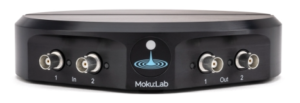Liquid Instruments, the developer of Moku:Lab, the software-configurable hardware platform for precision test and measurement and advanced digital signal processing, today announced that it has raised $8.16 million (USD) in a Series A funding round. The round was led by US-based Anzu Partners and includes follow-on investor ANU Connect Ventures in Australia. 
The funding will be used to accelerate Liquid Instruments’ product development as the company continues its growth in the education, research and industrial measurement markets in the US, Europe and Asia.
Liquid Instruments was founded in 2014 by a team of experimental physicists and engineers, including former researchers from NASA’s Jet Propulsion Laboratory, with expertise in precision measurement and gravitational wave detector instrumentation. The company’s flagship product, Moku:Lab, integrates 12 precision test and measurement instruments into a single, compact hardware device using a field-programmable gate array (FPGA)-based software-reconfigurable platform.
“We started Liquid Instruments because we were frustrated with how little innovation there had been in test and measurement equipment,” said Prof Daniel Shaddock, CEO of Liquid Instruments. “Labs today often look the same as they did thirty years ago because they are using the same oscilloscopes, spectrum analyzers, waveform generators, and other conventional instruments – much like if businesses still used calculators and typewriters instead of computers. We designed Moku:Lab with the idea of taking the best in modern user interface design and bringing it to the test and measurement industry, while utilising powerful digital signal processing to build multiple system capabilities into a single hardware device.”
Moku:Lab is controlled through Liquid Instruments’ iPad App, or its LabVIEW, Python and MATLAB APIs (Application Programming Interfaces).
“We remain deeply focused on improving user workflow,” said Shaddock. “With Moku:Lab, users can save data to the cloud, analyse results right from the device, and use intuitive features to help them complete tasks much faster than with legacy instruments.”
“To replicate all that Moku:Lab can deliver would require tens of thousands of dollars in separate equipment purchases and significantly more lab space to house it all,” said Shaddock. “Moku:Lab’s suite of precision instruments, mobile form factor, and modern user interface allows scientists and engineers to significantly reduce labs costs and space, while improving the efficiency and accuracy of their test and measurement data collection and analysis.”
Australian National University Vice-Chancellor and Nobel Prize winning physicist Professor Brian Schmidt AC said Liquid Instruments is a leading example of the commercial benefits of scientific research.
“This technology was originally developed to detect gravitational waves in one of the most sensitive measurement devices ever constructed,” said Schmidt. “Now Professor Shaddock and his team are sharing this tech with the scientists and engineers of the world to help unlock the next wave of great discoveries.”
 Instrumentation Monthly Test | Measurement | Control
Instrumentation Monthly Test | Measurement | Control




